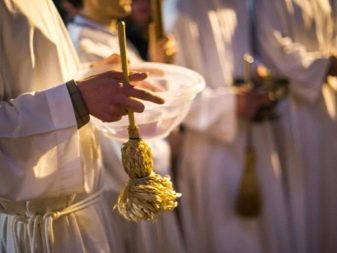All about Catholic Easter

Christianity is one of the most widespread religions on the planet and includes several main directions. They have certain differences in traditions and rules regarding holy holidays.
Not only the rituals themselves can differ, but also the dates. - Catholic Easter and Orthodox Easter are held on different days. If you want to congratulate a representative of another denomination, you should find out how and when you can do it.
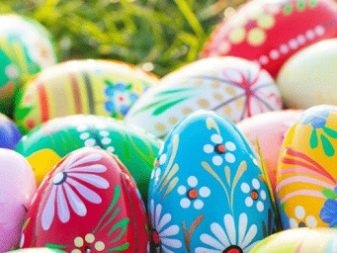
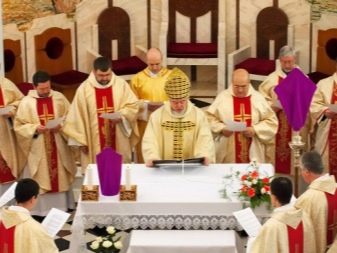
When do Catholics celebrate Easter?
Orthodox Christians know that the holiday does not have a fixed day in the calendar; the date changes every year. For Catholics, the situation is the same, in this the traditions coincide. Not everyone knows why Easter is celebrated on different days. To understand this issue, you need to delve into history. The problem is that the exact date of the Lord's Resurrection is unknown. To this day, only information has come down that this happened in the spring, during the Jewish holiday of Passover. During the Ecumenical Council in 325, a specific decision was made regarding the holy day. The resolution included the following points:
- the holiday must necessarily take place on a Sunday;
- the calculation should be carried out from the date of the vernal equinox - it is necessary to determine when the first full moon will be, and then count another week.
In the end it turned out that the holiday has become "mobile", each year the number is calculated anew, according to the calendar and taking into account astronomical features... Until a certain point, the numbers for Orthodox and Catholics coincided, but in the 16th century, disagreements began between confessions.
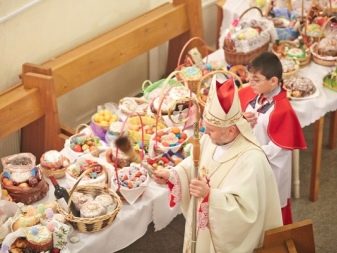

This was due to the difficulty of calculations, certain points raised a lot of doubts:
- the church used a fixed equinox date - March 21, although astronomically this phenomenon can also occur on the 19th or 22nd;
- full moon day was also determined by the calculation list, and not by the actual position of the celestial body;
- Besides, moon month each year is shifted by several hours, which also made calculations difficult.
Because of these nuances, there were discrepancies with the church and astronomical calendar, which raised many questions. One of the clergy suggested that the Pope carry out a reform that would solve the problem. This is how the Gregorian calendar appeared, which the Catholic Church still uses today. In Orthodoxy, they did not change traditions, therefore Easter is still considered according to the Alexandrian canons, it is determined according to the old style - hence the difference in dates.
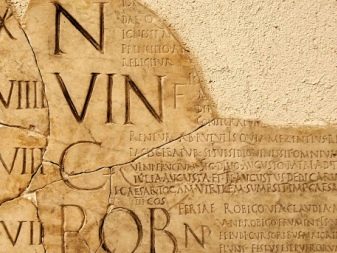
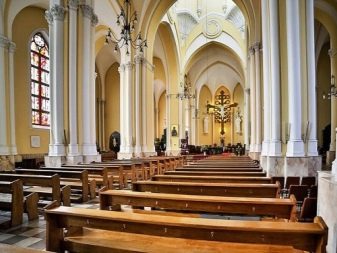
When do Orthodox and Catholic Easter dates coincide?
Sometimes the day of the holy holiday falls on the same date. For this, it is necessary that the full moon takes place in the interval between the equinox and the Bright Resurrection according to the new and old styles. According to calculations, the closest match is expected on April 20, 2025. The same situation will be in 2031, 2034, 2037.
At other times, the difference between holidays can be from a week to 45 days. It should be borne in mind that Catholic Easter is celebrated earlier than Orthodox, so if you want to congratulate someone, do not forget to do it on time.
And also you need to remember that not only the day of celebration is different, but also some traditions inherent in this important event.
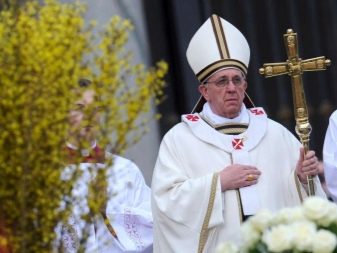
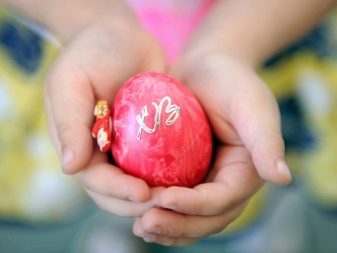
Why does the Holy Fire not descend?
One of the Easter miracles can be observed during the festive service in the Church of the Holy Sepulcher in Jerusalem... On this day, the Holy Fire descends, which is considered sacred. The flame arises spontaneously, without the participation of people, therefore, it is attributed to a divine origin and is treated with special respect. Priests carry particles of fire to all Orthodox churches and even send them on special flights to other countries so that believers can touch this shrine. However, Catholics have a different view of this phenomenon.
If we turn to history, we can see that representatives of this confession do not take part in the divine service, during which the descent of the Holy Fire takes place, since 1187. Also, the Catholic Church does not officially recognize the divine or miraculous origin of this flame. Taking this into account, a particle of the Holy Fire from Jerusalem is not ignited in churches, as in the case of the Orthodox. Nevertheless, during services in Catholic churches, priests bless the burning flame and Easter - a large candle, from which the parishioners then light small candles.
In addition, although Catholics do not recognize the divine origin of fire, they usually do not criticize this phenomenon and respect Orthodox traditions.
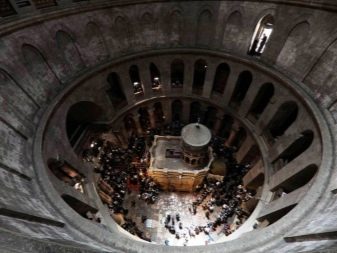
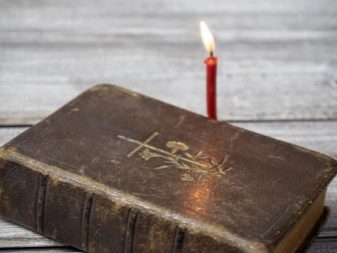
Celebration in different countries
The Catholic faith is widespread in Europe. However, if you look at how Easter is held in different countries, you can find some differences, despite the general religious direction. Basically, the difference lies in what dishes are prepared on this day, how people congratulate each other, and what symbols are associated with the holiday.
In Germany
Bonfires are made on the Saturday evening before Easter. This is done near churches, in squares and even in the courtyard, if possible. The fire symbolizes purification and the arrival of spring. This tradition is somewhat reminiscent of the Russian Maslenitsa. There is an old belief that a bunny brings colorful eggs to children at Easter. These are echoes of ancient legends in which hares acted as sacred animals associated with the goddess of spring.
The symbol has taken root and has already become associated with the Christian holiday, therefore, you can often see a rabbit with a basket of eggs on German Easter cards. It is also customary to give chocolate figurines in the form of this animal and other sweet treats for children. On the festive table you can see a variety of egg dishes. They are eaten not only boiled, but also served with scrambled eggs or omelet. Often they add bacon and sausages - a national German dish.



In italy
Believers always strive to get to the capital in order to hear congratulations from the Pope and receive a blessing. Those who cannot afford the trip watch the ceremony on TV. On the table on this day are usually traditional dishes: lamb with artichokes, pies with eggs and cheese. And also Italians bake products called "colomba" - they are somewhat reminiscent of our Easter cakes, only they also contain lemon and almonds.
Interestingly, Monday is also considered a holiday, right after the holy day - it is officially recognized as a day off. People in the country often take advantage of this to go on a picnic with family or friends and have a good time outdoors.
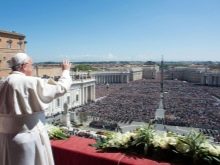

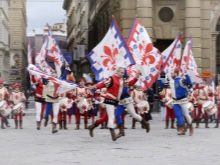
In France
Here, as in Germany, the Easter bunny is popular as a holiday symbol, and children are eagerly awaiting treats and sweets from it. It is customary to celebrate with the family, close relatives gather at the same table to chat. Fried chicken is served as the main dish.
Besides the hare, there is another symbol that can often be found in France. This is a bell, because the chime is associated with Easter. It is customary to decorate the house with miniature bells and garlands, and chocolate figurines in the form of this symbol are a popular gift for children and adults.

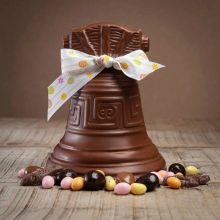

What can and cannot be done?
For Catholics, Easter is as important as for Orthodox Christians. This is a great holy day for all Christians, regardless of which direction they belong. It is advisable to spend the holiday with righteous thoughts, pray, go to church, and visit relatives. The following actions are prohibited:
- housework, including sewing or knitting, and gardening;
- visiting entertainment establishments - clubs, karaoke, restaurants;
- you should not turn on music loudly at home, throw parties;
- you cannot get married on this day, the exception is England, where traditions allow it.
In addition, on a holy day, you cannot swear and insult others, envy someone and do bad deeds. Despondency and sadness will also be considered a sin.



Before Easter, it is customary to observe fasting; on the holiday itself, restrictions no longer apply, but this does not mean that you can overeat with what was inaccessible. Moderation in food and drink is encouraged. When Great Saturday comes, believers go to the all-night service, which ends with a procession of the cross. Parishioners bring home from the temple holy water, sacred fire, wax from church candles. All this is used to bless the home and family members, to protect them from negativity and problems. In some countries, priests visit parishioners' homes on the eve of the holiday to consecrate them.
After attending church, custom is to spend time with your family, arrange a festive dinner for loved ones, or visit relatives. It is also customary to give small gifts - most often these are sweet decorations, souvenirs with Easter symbols, pleasant trifles and postcards.
The main thing is to spend this day with bright thoughts, devote it to God and spiritual affairs, take care of your relatives and devote time to them. In this, the traditions of all Christians coincide.
